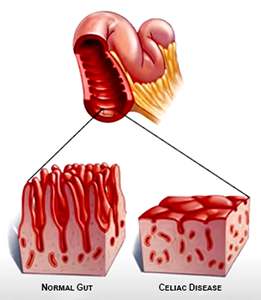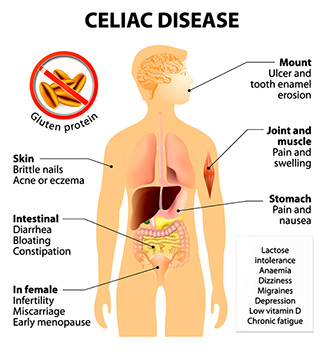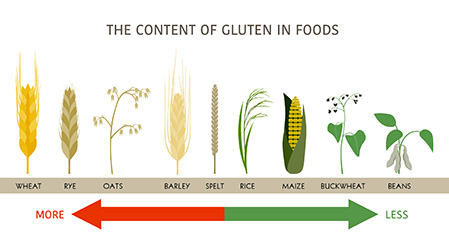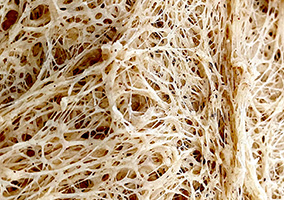All about Gluten allergy, Celiac Disease, Non Celiac Gluten Sensitivity (NCGS), FODMAP Sensitivity...
Gluten is a protein found in grains. The purpose and function of gluten is to provide a food source for the development of the wheat plant.
Celiac Disease comes to mind when gluten is mentioned. Celiac disease is an extreme allergic reaction of our metabolism and immune system to gluten in grains, more precisely, it is an autoimmune disease caused by this reaction. Celiac disease is more common in people who carry the HLA gene.
Celiac disease develops as follows, the immune system perceives this substance called gluten as a foreign substance, first shows a reaction against gluten, and then the immune system starts to show a reaction against its own tissues by disorienting its target. In celiac patients, this reaction occurs against the tissues of the digestive system.
Apart from that, as with any autoimmune disease, this reaction causes a general inflammation throughout the body and produces the symptoms listed below.
Celiac disease damages the digestive system, especially the small intestine. As we have explained before, the immune system misses its target, develops antibodies against its own digestive system tissues, and attacks the structures called Villus that allow the absorption of nutrients, causing serious damage and devastation especially in the small intestines. As a result, typical symptoms of Celiac patients are seen when they encounter gluten.
Common problems in Celiac patients:
- Stomach ache,
- Feeling of indigestion and bloating,
- Diarrhea,
- Constipation,
- Weakness,
- Weight loss,
- Iron deficiency, anemia,
- Mental disorders and depression,
- Itchy rashes on the skin,
- Joint pains,
- Menstrual irregularities in women,
- General complaints such as palpitations, shortness of breath.
Celiac disease is a very serious disease that is definitely related to gluten. In the diagnosis of Celiac disease, a number of biochemical, immunological and genetic scientific tests specific to Celiac are performed and the disease is definitively diagnosed in this way. Beyond that, signs of Celiac disease are found pathologically in small intestinal biopsies.
Along with
Celiac Disease, a condition known as
Non Celiac Gluten Sensitivity (NCGS) has emerged in recent years. Learning the answers to two questions is important to understand Gluten Sensitivity.
1- Is gluten a substance that has a harmful effect on normal people? Hundreds of scientific studies on this subject have confirmed that gluten is not harmful to healthy people. In a study conducted at Harvard University in 2015, an article was published in the form of a summary and commentary of all the studies carried out to date, and it was determined that gluten is not harmful in healthy people, but that a long-term gluten-free diet harms the digestive system and especially the
beneficial probiotic bacteria in the intestines.
Detailed reading:
Effects of a gluten-free diet on gut microbiota and immune function in healthy adult humans
2- Is there such a thing as gluten sensitivity? In recent years, there has been a significant increase in the number of people who experience Celiac-like ailments in people who consume Gluten-containing foods. This increase has been so great that the medical world has felt the need to give it a name. In short, the situation called Gluten Sensitivity (Non Celiac Gluten Sensitivity) is now being seriously studied and discussed by the scientific community.
Detailed reading:
Nonceliac Gluten Sensitivity,
Non-celiac gluten/wheat sensitivity (NCGS)—a currently undefined disorder without validated diagnostic criteria and of unknown prevalence,
Non-celiac gluten sensitivity. Is it in the gluten or the grain?
What makes this issue more complicated is that there is no Hematological or Biochemical test to confirm this in people with Non Celiac Gluten Sensitivity (NCGS). Likewise, when bowel biopsy is performed in these individuals, pathological findings similar to celiac disease are not observed. So Non Celiac Gluten Sensitivity complaints are simply based on the statement that people experience Celiac-like ailments when they eat gluten-containing foods. In scientific studies conducted in the USA on patients with Non Celiac Gluten Sensitivity, 82% of patients said that they felt uncomfortable even when they ate gluten-containing or gluten-free food (placebo). However, only 18% of patients actually experienced discomfort after eating gluten-containing foods.
Detailed reading:
Suspected Nonceliac Gluten Sensitivity Confirmed in Few Patients After Gluten Challenge in Double-Blind, Placebo-Controlled Trials,
No effects of gluten in patients with self-reported non-celiac gluten sensitivity after dietary reduction of fermentable, poorly absorbed, short-chain carbohydrates,
Re-challenge Studies in Non-celiac Gluten Sensitivity: A Systematic Review and Meta-Analysis,
Exposure to Different Amounts of Dietary Gluten in Patients with Non-Celiac Gluten Sensitivity (NCGS): An Exploratory Study
There are other factors that complicate matters further.
- Wheat Allergy,
- Spastic Colon,
- Irritable Bowel Syndrome,
diseases show the same symptoms as Gluten Sensitivity but they are totally different issues.
When a person complains of Gas, Abdominal Pain, Diarrhea, Constipation, and similar ailments, it is unlikely to know exactly whether they are due to Gluten. In the tests performed on this subject, it is understood that only 10-20% of the patients are really sensitive to gluten.
Detailed reading:
Non-Celiac Gluten Sensitivity,
Irritable Bowel Syndrome (IBS) and Non-Celiac Gluten Sensitivity (NCGS): Where Is the Culprit Hiding? Nutritional Tips for Gastroenterologists,
Non-Celiac Gluten Sensitivity: All wheat attack is not Celiac
Another player in Gluten Sensitivity is
FODMAP Sensitivity: Fermentable Oligosaccharides, Dissaccharides, Monosaccharides and Polyols. FODMAPs are a different group of carbohydrates, and it has been understood that their digestion can cause similar disturbances to Gluten Sensitivity.
FODMAP Substances found in:
- Fructan: In Cereals and Onions-Garlic,
-
Lactose: In Milk and Dairy Products,
-
Fructose: In Fruit and Honey,
- Galatan: In Pulses Foods,
- Polyol: In Fruits.
These substances produce symptoms similar to gluten sensitivity. If a person is confident that FODMAP-containing foods are irritating, a diet poor in these substances can help reduce the ailments.
Gluten is a substance that does not harm health and does not cause any problems in people with a normal digestive system, this issue has been confirmed by hundreds of scientific studies.
Is Gluten Sensitivity a disease? Unfortunately, there are no tests to definitively define this ailment. Only the statements of people who are uncomfortable with eating Gluten-containing food are taken into account. For this reason, the issue of Gluten Sensitivity is approached more carefully and studies are continuing.
The HLA gene found in Celiac Patients can also be found positive in approximately 20-25% of people suffering from Gluten Sensitivity. While the rate of Celiac Patients in the community is around 1%, the rate of Non Celiac Gluten Sensitivity patients is estimated to be 10%.
In the last 5-10 years, after the emergence of the Gluten Free fashion, a new industry of Gluten-free foods has developed, especially in the United States, with a business volume of 6-7 billion dollars per year. Controversies over Gluten fuel this industry.
About 40 years ago, there was Celiac Disease in medical books, but there was no such thing as Gluten Sensitivity. There is a book called Merck Manual, which is considered the summary of medicine, it is updated and reprinted every 4-5 years, again, until 10 years ago, no subject related to Gluten Sensitivity was included in this book. It has started to appear in the last one or two editions. The main question here is why was it not defined before, was it not defined because the doctors could not find it, or was it not defined because it did not exist?
There is no doubt that Gluten Sensitivity has increased over the past 5 years. But parallel to this, there is a serious increase in auto-immune diseases. Again, 40 years ago, Hashimoto's Disease, which is an auto-immune disease that affects the thyroid and is encountered in one in a million, has started to be seen at a serious rate in the last 10-15 years in patients with diseases such as
obesity, heart disease,
blood pressure and
diabetes, especially in women. Another example is the massive increase in childhood allergies. Such as allergy to cat-dog hair, allergy to flower pollen...
Again, 30-40 years ago, childhood allergies were very rare, especially in America, for example the peanut butter jelly sandwich, which has been the standard breakfast or lunch of children for decades, has disappeared, and peanut allergy has become a mind-blowing epidemic. For 50 years, 100 years, people have eaten peanuts without any problems, but in the last 10-15 years, very serious, fatal cases of peanut allergy have emerged.
Again, in the last 10-15 years, the cases of autism have increased greatly. 20-25 years ago, movies like Rain Man were made when autism was rarely seen. Today, an autism patient is found in almost every family or relative.
The main reason for all this may be the deterioration in the immune system in the last 10 years. When it is out of balance, the immune system can do unpredictable things, go off target, develop antibodies against thyroid tissue or intestinal tissue, create allergies and cause diseases...
Undoubtedly, one of the leading factors that impair our immune system is the unhealthy diet which has been increasing in recent years. An unhealthy diet disrupts the intestinal flora, the microbiome, and changes the bacterial balance against good and beneficial probiotic bacteria. There is a very close relationship between probiotic bacteria and the immune system, if the positive balance between good and bad bacteria changes, the immune system is also impaired. Chemicals used in plants, GMO additives, artificial sweeteners and similar unnatural substances are among those that are harmful to the intestinal flora and the good probiotic bacteria, and all these overwhelm the immune system.
In order to regain your Intestinal Flora's bacteria health, boost your Nitric Oxide, Antioxidants and Omega 3 levels with
Wellness Triangle which will also prevent cell deformation, protect heart and cardiovascular health, improve immune response, and prolong your life span. After only 30 days of regular use, you will easily notice the changes on your body, but better is to get a blood test at the beginning and at the end of the cure to see all the regenerations on the results. Take action today, improve your health, enhance your life quality... tomorrow may be too late!
Wellness Triangle is the best supplement, a complete support, unique in the world, that provides a healthy living with the regular use of only 3 products.
Learn More
Back to Home












